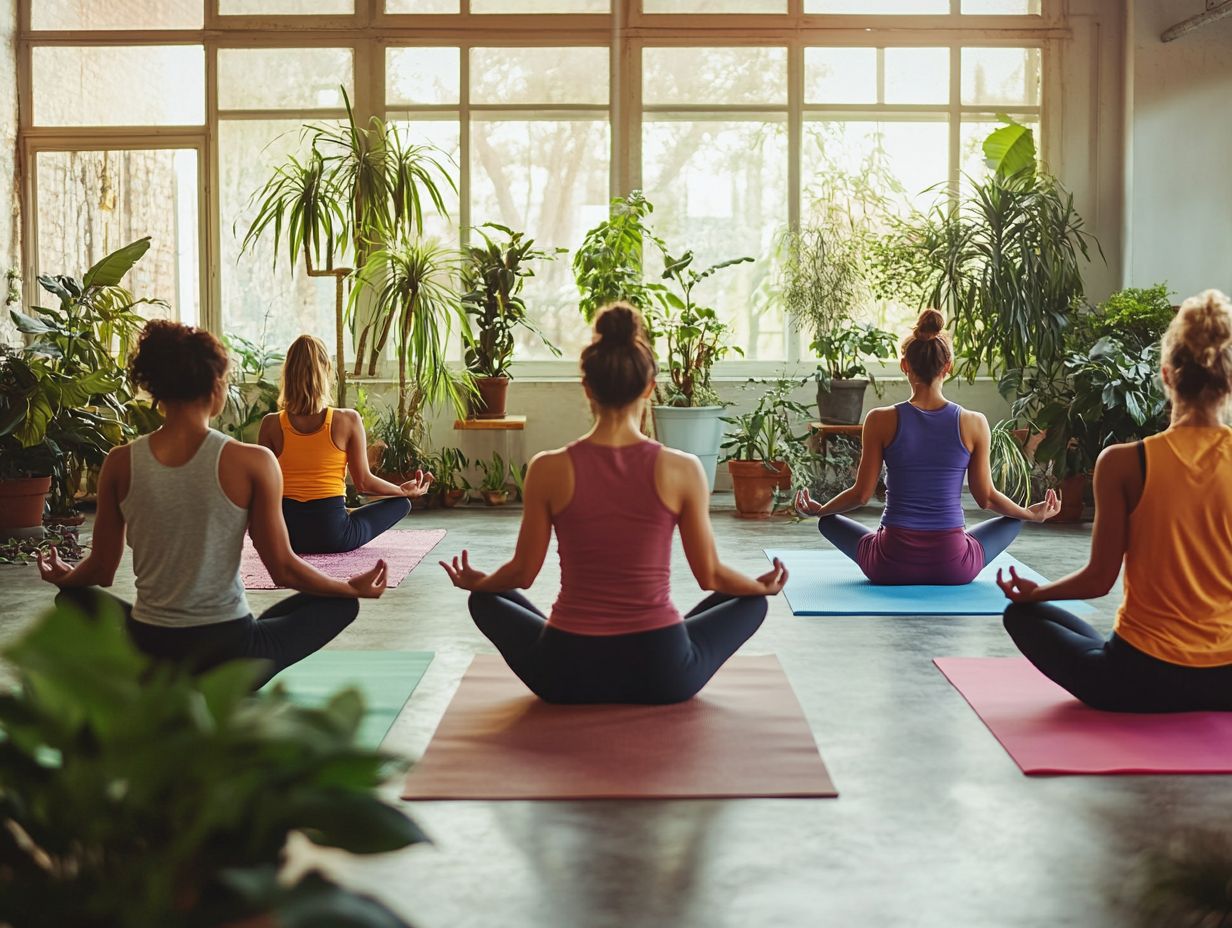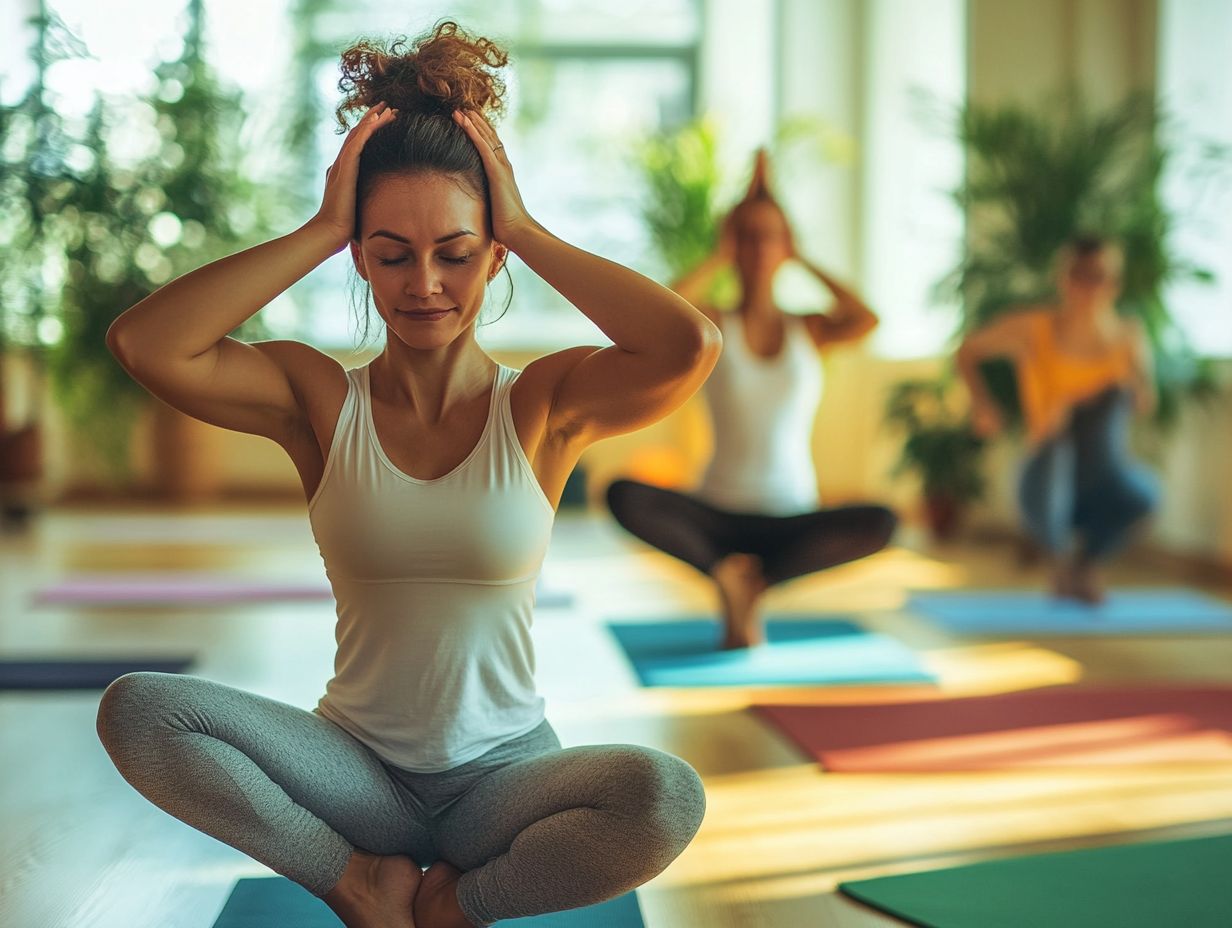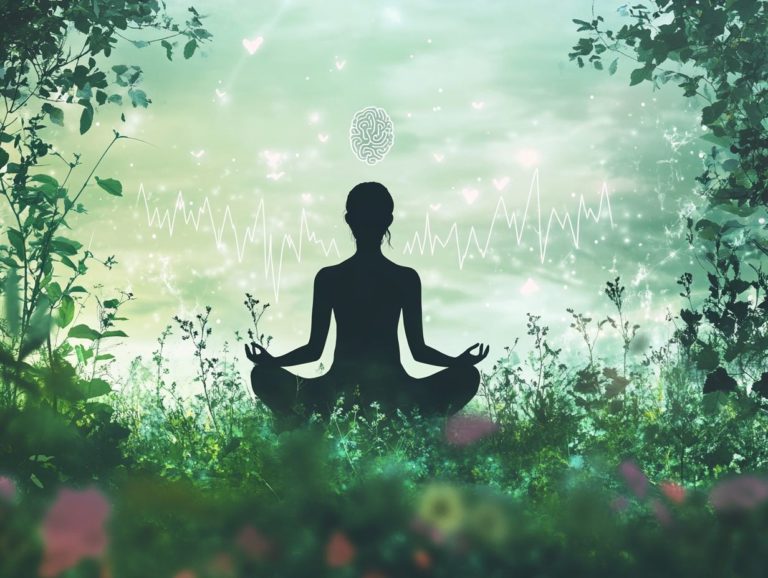The Benefits of Yoga for Physical and Mental Health
Yoga transcends mere trendiness; it is a timeless practice that provides an array of benefits for both physical and mental well-being.
Whether you aim to enhance your flexibility and strength, alleviate discomfort, or seek a serene refuge from stress and anxiety, yoga has something to offer you.
This article explores the rich history and origins of yoga, unveils its numerous benefits, and provides practical advice for seamlessly integrating this practice into your daily routine.
Discover how to tailor your yoga journey to fit your needs and unlock its full potential.
Contents
Key Takeaways:

Yoga improves flexibility and strength, reducing the risk of injuries and pain in the body.
It reduces stress and anxiety while improving mental clarity and focus, promoting overall mental well-being.
Choosing the right yoga practice and sticking with it can lead to great physical and mental benefits.
History and Origins
Yoga boasts a rich and diverse history stretching back thousands of years. It is filled with various styles and practices designed to cultivate a profound mind-body connection for overall health.
Originating in ancient India, yoga has gracefully evolved over time, influenced by the Yoga Sutras and the needs of modern practitioners. Influential figures like Natalie Nevins, DO, have played a significant role in its growing recognition in the West, where many embrace yoga for its myriad health benefits.
Deeply rooted in ancient Indian philosophy, yoga s origins can be traced back to revered texts such as the Upanishads and the Bhagavad Gita, which delve into the nature of existence and consciousness.
The Yoga Sutras, penned by Patanjali, serve as a foundational text that outlines the practices and ethics of yoga, guiding practitioners through their transformative journeys. Over the centuries, various styles have emerged, including Hatha, Vinyasa, and Ashtanga, which are different styles of yoga, each offering unique philosophies and approaches.
Today, yoga studios and retreats flourish globally, presenting tailored experiences that cater to individual needs whether you seek stress relief or physical fitness making it an essential part of modern wellness culture.
Physical Benefits of Yoga
The physical benefits of yoga are well-documented, highlighting enhancements in flexibility, strength, and overall health.
By engaging in regular yoga practice, you ll experience a harmonious blend of poses and flexibility training that sharpens your body awareness while playing a crucial role in injury prevention and alleviating chronic pain.
Many practitioners discover that these physical adaptations lead to a remarkable improvement in their quality of life, making yoga an essential part of a vibrant, healthy lifestyle.
Improving Flexibility and Strength
Improving flexibility and strength is at the heart of any effective yoga practice. As you flow through various poses, they work together seamlessly to enhance your physical capabilities and deepen your body awareness.
By regularly engaging in these stretches and exercises, you can achieve greater mobility and build muscle strength, cultivating a balanced physical state.
Specific poses like Downward Dog and Warrior II are crucial in this journey. They offer targeted stretches that promote flexibility while also challenging your strength.
In Downward Dog, you ll experience a profound stretch through your hamstrings and calves, improving your overall mobility and alignment. In contrast, Warrior II enables you to develop strength in your legs and core while encouraging stability and focus.
Integrating these poses into a consistent routine amplifies your physical prowess and enhances your body awareness. This allows you to understand your body better and track your progress over time.
With dedication to your practice, you can achieve noticeable gains in flexibility and strength, fostering a healthier, more agile lifestyle.
Don t wait start your yoga journey today to experience these amazing benefits!
Reducing Pain and Injuries

Yoga is a powerful tool that helps you relax and can prevent injuries while promoting healing.
Through mindful practices and targeted movements, you can find significant relief from chronic pain and lower the risk of injuries in your daily life.
Incorporating specific yoga poses like Child’s Pose and Cat-Cow into your routine can gently stretch and strengthen your muscles, improving flexibility and circulation.
These poses release tension and stimulate your body s natural healing processes.
Using relaxation techniques, such as deep breathing and meditation, can dramatically lower your stress levels, which is essential for anyone dealing with chronic pain.
The benefits of these practices are profound, including better blood flow, reduced muscle stiffness, and increased body awareness.
This creates an environment that supports health improvement and effective pain management.
Mental Benefits of Yoga
The mental benefits of yoga provide an impressive range of enhancements to your mental health, including effective stress relief, anxiety management, and improved mental clarity.
By regularly practicing yoga and meditation, you build emotional resilience and deepen your understanding of self-awareness and mindfulness.
This journey ultimately leads to better emotional health and enriches your overall well-being.
Stress and Anxiety Reduction
Yoga is an excellent method for easing stress and anxiety, using various breathing techniques and mindful practices that soothe both your mind and body.
When you focus on your breath during yoga, you can unlock a deep sense of relaxation and significantly lower anxiety levels, creating a more balanced emotional state.
One key technique is deep breathing, which encourages you to take full inhalations, enhancing oxygen flow and activating your body’s natural relaxation response.
Research has shown that deep breathing reduces cortisol levels, the well-known stress hormone, while also sharpening your focus.
Another popular technique is alternate nostril breathing, which balances energy in your body and calms your nervous system. Both methods, grounded in ancient wisdom, have been validated by modern science, proving their effectiveness in nurturing calmness and overall well-being.
Improving Mental Clarity and Focus
Enhancing your mental clarity and focus through yoga involves combining physical postures, mindful breathing, and meditation to boost your cognitive skills.
As you engage in these activities, you may notice a significant improvement in your concentration while mental clutter fades away, contributing to your overall mental health.
Studies indicate that yoga can greatly increase your attention span and problem-solving abilities. For instance, research published in the Journal of Cognitive Enhancement shows that people who practice yoga regularly experience notable improvements in the skills needed to manage tasks and make decisions.
Experts assert that the meditative aspect of yoga fosters mindfulness, allowing you to become more aware of your thoughts and feelings. This heightened awareness aids in emotional regulation and sharpens your focus, enabling you to think more productively and insightfully.
Incorporating Yoga into Daily Life

Integrating yoga into your daily routine can significantly enhance your well-being, promoting healthy habits and personal growth.
Whether attending classes or practicing at home, you can easily incorporate mindfulness and relaxation techniques into your life.
This thoughtful integration leads to lasting improvements in your quality of life and mental health.
Start your yoga journey today!
Finding the Right Practice for You
Finding the right yoga practice is crucial for unlocking its full health and wellness benefits, as various styles cater to different needs and preferences. From Hatha, a gentle form of yoga focused on basic postures and breathing, to restorative yoga, discovering the practice that truly resonates with you can transform your experience into something far more fulfilling and effective.
Your journey into the world of yoga begins with an exploration of its diverse forms. Perhaps you re drawn to Vinyasa for its dynamic flow, or maybe Yin yoga, with its focus on deep stretches and relaxation, speaks to you. Each style offers unique benefits, whether it s building strength, enhancing flexibility, or promoting mental clarity.
As you explore your options, consider your personal goals whether it s stress relief, increased physical fitness, or something else entirely. It’s also wise to take into account any physical limitations that may guide your choice. Taking the time to find the right practice can truly elevate your health journey!
Ultimately, this connection will help you build a stronger relationship with your body and mind.
Tips for Consistency and Progression
Maintaining consistency and progression in your yoga practice can significantly elevate your journey toward improved health and self-awareness. By establishing a routine and setting achievable goals, you can cultivate confidence and stay motivated as you navigate your yoga journey.
Creating a dedicated schedule whether it s a specific time each day or certain days of the week allows you to seamlessly integrate yoga into your life, making it an essential part of your self-care regimen. Setting both short-term and long-term goals gives you a clear roadmap to follow, enhancing your focus and commitment.
Consider keeping a journal to track your progress; this not only encourages reflection on your journey but also highlights your achievements, boosting your confidence over time. Remember, even the smallest milestones deserve recognition, as they all contribute to a holistic approach to your health and a stronger sense of self.
Frequently Asked Questions
What are the benefits of yoga for physical health?

Yoga is known to improve flexibility, strength, and balance. It can also help with weight management, increase energy levels, and improve cardiovascular health.
How does yoga benefit mental health?
Engaging in regular yoga practice can reduce stress, anxiety, and depression. It can also improve mood, promote relaxation, and enhance overall well-being.
Can yoga help with chronic pain?
Yes, studies have shown that yoga can help alleviate chronic pain, especially in the lower back, neck, and knees. It can also improve mobility and range of motion.
Is yoga safe for all ages and fitness levels?
Yes, yoga can be modified to suit different ages and fitness levels. It is recommended to consult with a certified yoga instructor to determine the best approach for your individual needs.
What are some other benefits of yoga?
In addition to physical and mental health benefits, yoga can also improve sleep quality, boost immune system function, and enhance self-awareness and mindfulness.
How often should one practice yoga to see results?
Practicing yoga 2-3 times a week can lead to noticeable results, but even just a few minutes of daily practice can have positive effects on physical and mental well-being. Consistency is key for seeing long-term benefits.






